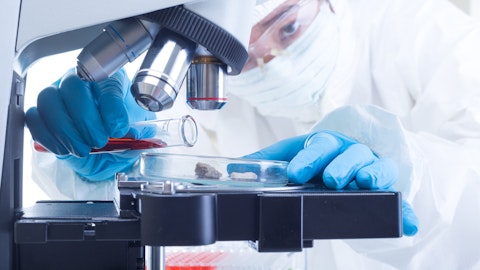Tony Hunt: Yes. There’s no doubt that resin availability has continued to improve as we’ve gone through the year. I think the piece for us that’s maybe changed is it’s hard to predict what percent of our customers are going to ask us to procure resin to pack the columns, especially outside North America. So kind of Europe and Asia are the two regions where we’ve had more Repligen and that’s impacting the growth that we’re seeing on the Chromatography side. And when we look at like Q3, our volume is up, right? So when you look at the number of columns that we’re producing and shipping, it’s going up and it’s going to continue to go up. When we get into next year, I think you’re right. I think resin availability should be less of an issue.
I mean, I think it’ll be normal. For high volume resins, it’s probably going to be in that six week to nine week period. But for large, much larger volumes, it’s going to be probably closer to 12 weeks, 13 weeks. But again, that’s really the discretion of the big suppliers of resins. But yes, I agree more visibility in 2024, and it should be back to a more normal year for our Chromatography business.
Dan Arias: Okay. Thank you.
Operator: Thank you. And the next question comes from Puneet Souda with Leerink Partners.
Puneet Souda: Yes. Hi, Tony. Thanks for taking the questions. And Jason great to have you on Board. And so Tony just wanted to clarify, I think you said first half 2024 sequentially should improve from second half of 2023. And then expecting that you are going to grow further from that in second half of 2024. So I mean, it’s fair to say that 2024 should grow versus 2023. It’s just hard to sort of quantify the magnitude. And I appreciate that. So I just wanted to clarify that. And then ultimately, do you think the 15% to 20% base business growth algorithm that you have for the longer term, is that still intact?
Tony Hunt: Yes. Maybe start with the 20% base business growth in the longer term. We see no reason why our business can’t grow at that level. We have a highly differentiated portfolio of products. We’re bringing new products to market. We’re seeing traction in the field. We have less competition on a per product basis. So I think long term and normal years for bioprocessing, we should be able to grow at that level. When you talk about next year, it’s just, you’re right. It’s hard to quantify what growth could look like next year. But remember, what we’re talking about is base business growth, not overall, because remember we had some COVID-related revenue in 2023. But yes, look, when we get to the February call, we’ll obviously be telling you exactly what 2024 is going to look like, and we’ll probably – when we get to the three, four months from now we’ll have a much better idea as well about the order run rate.
Order run rate is what’s key to the growth. And I think we’re happy that Q3 finished strong and the start of Q4 has been a good start to the quarter for us as well on orders.
Puneet Souda: Got it. And then on the gene therapy side, just wanted to clarify, when you look at the progression of sort of the Phase 1s to 2s and how the products are getting approved and getting into the commercial, how they’re getting commercialized. Are you feeling confident that sort of as we go into 2024, Repligen will continue to be levered more and more to phase – later phases and later stages of the drugs and continue to see growth from that. I guess the main question is sort of the sustainability of the gene therapy progress that you’re seeing here. And sort of how much of the order book contribution is really sort of coming from gene therapy versus mAbs. Thank you.
Tony Hunt: Yes. I think on gene therapy, we’re a little bit of a proxy on the industry. Remember, we were in early. We’re well embedded in small, medium, and large gene therapy accounts. So as the progression happens from Phase 1 to Phase to Phase 3 to commercial, we should follow that very much in parallel. I can’t tell you what it’s going to be next year because I think you still have to see what happens with drugs that are up for approval this year. But if you take like the top 25 accounts, they’re all scaling at the average dollar spent of those accounts is going up. So I think that’s also a really positive sign for us.
Puneet Souda: Got it. Okay. All right. Thanks, Tony.
Tony Hunt: Yes. Thanks.
Operator: Thank you. And the next question comes from Matt Larew with William Blair.
Matt Larew: Hey, good morning. If I think about some of the differences between perhaps your CDMO customers relative to pharma or gene therapy, is there anything to call out, whether it’s modality exposure, control of a pipeline, perhaps different level of inventory stocking and now destocking, regional exposure, anything that might point to why there’s sort of that discrepant recovery right now?
Tony Hunt: Yes. I think on the CDMO side, there was clearly a lot of inventory build, and I think that’s a big part of what’s going on. There is a lot of activity happening at CDMOs. We do expect that as we finish off the year, we get into next year, CDMOs are going to improve. We’re having lots of conversations. There’s a lot of projects out there. We kind of have to close them and I’m just talking about Repligen, and I’m not talking about the market in general, but we have some opportunities in CDMOs. We’ve got to do some execution over the next couple of quarters, and that should really help us in 2024.
Matt Larew: Okay. Thanks. And then on China, sort of another couple months since we last spoke to observe what’s going on there. Anything to update either from a competitive perspective, macro perspective, or customer perspective.
Tony Hunt: Yes. On the macro side, I – not a whole lot has changed. It’s still a tough environment. I think you hear it from all the players on the life science tool side talking about what’s going on in China. We don’t expect any recovery until we get into next year. There’s a few pockets of goodness, but it’s just counterbalanced by stuff that’s not happening. So yes, China hasn’t changed much at all over the last three months.
Matt Larew: Okay. Thanks.
Operator: Thank you. And the next question comes from Matt Hewitt with Craig-Hallum Capital Group.
Matt Hewitt: Good morning. Congratulations on the improvement that you’re seeing and thanks for the update. Maybe first off kind of digging in a little bit more on the destocking, would you say that we’re pretty close to being done with that process as you speak to your CDMO customers? And at this point, is it more a function of some of the funding and just some of the conservatism by some of the – their pharma customers, or what do you think is maybe the hold up there?



